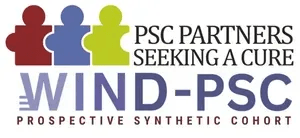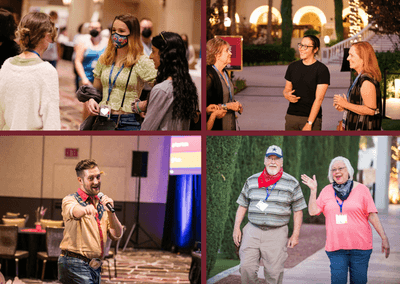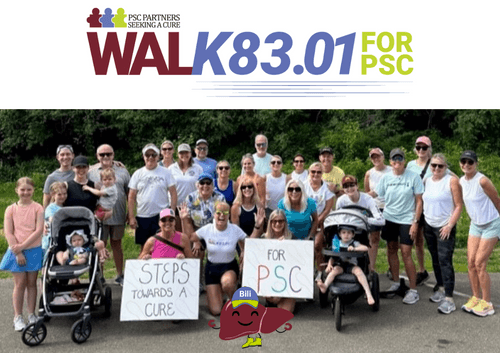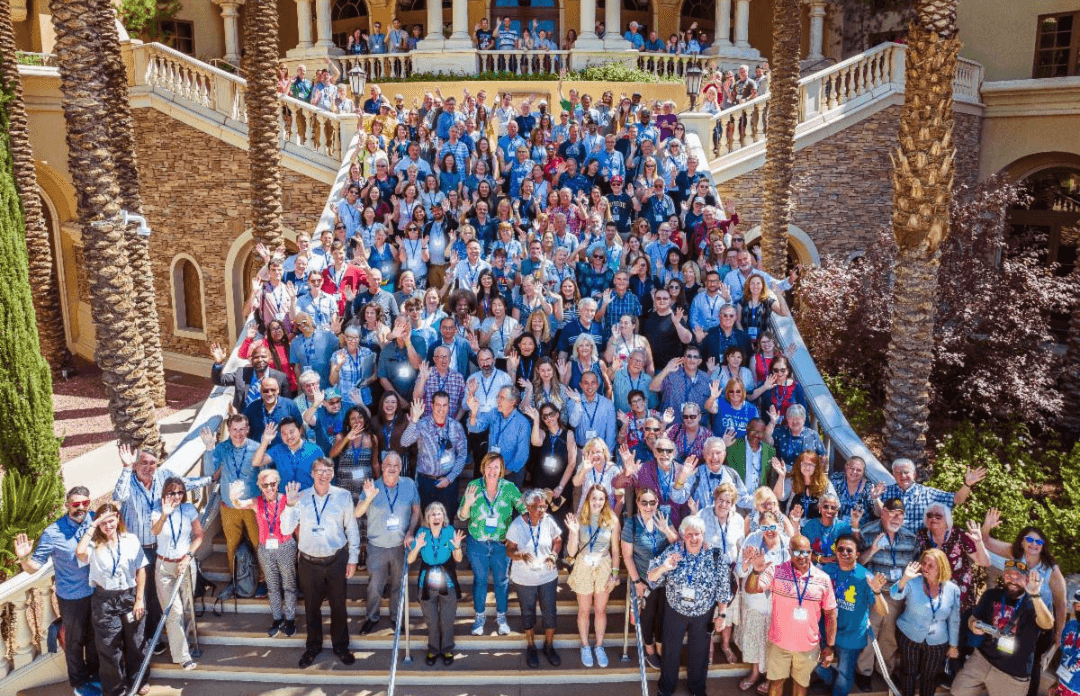Illuminating Hope on the Path to a Cure!
PSC Partners Seeking a Cure accomplishments in 2023 were made possible by the support of our committed community of patients, caregivers, board members, staff, Scientific Medical Advisory Committee, researchers, medical providers, industry supporters, and amazing volunteers – all shining stars in the search for treatments and a cure for PSC.
Accomplishments include research, the Patient Registry, community support and education efforts, and more!
PSC Partners Seeking a Cure 2023 Accomplishments

RESEARCH GRANTS: Established in 2009, the PSC Partners Research Grants program has been instrumental in fostering novel science and supporting new investigators in the field. Together, PSC Partners and PSC Partners Canada selected four research seed grants in 2022, bringing our funding total to date to more than $6 million dedicated to PSC research. This year, those grantees made significant progress toward their study objectives. The start of 2023 was focused on improving the grant process, expanding our reach, and developing an outward communication plan. We’ve been so impressed by the quality and quantity of proposals this year and look forward to announcing this year’s awards in the spring of 2024. The most recent PSC Partners Research Grants were awarded for pioneering research, selected for their potential of discovering much-needed PSC biomarkers, and bringing the newest scientific tools to PSC research.
- Hepatic Unfolded Protein Response (UPR) in Murine Models of PSC - Lead Investigator: Young Investigator Alyssa Kriegermeier, MD, Northwestern University Feinberg School of Medicine
- Novel Proteome-Wide Autoantibody Discovery in Primary Sclerosing Cholangitis - Lead Investigators: Young Investigator Michael Li, MD, PhD and Joseph DeRisi, PhD, University of California, San Francisco
- Unraveling the Immune Triggers of Primary Sclerosing Cholangitis With and Without Concomitant Inflammatory Bowel Disease - Lead Investigator: Prof. Rinse K. Weersma, MD, PhD, University Medical Center Groningen, The Netherlands
- Targeting PSC Pathogenesis Using a Bifunctional Peptide, GP119, in the Mdr2-/- Mouse Model of PSC and Novel Multicellular Human-Derived 3D PSC Organoids - Lead Investigators: Heather Francis, PhD, FAASLD and Gianfranco Alpini, PhD, Indiana University (This project is supported by PSC Partners Canada.)
Funds donated through our WALK83.01 for PSC fundraising event supported two of these research programs for two years.
Click HERE for information on previously awarded research grants.

INTERNATIONAL COLLABORATIVE RESEARCH NETWORK: In September of 2023, PSC Partners hosted its first in-person scientific convening of the PSC Partners International Collaborative Research Network (ICRNetwork). The gathering consisted of in-depth presentations and discussions between 56 interdisciplinary experts from North America and Europe.
The primary objective of the ICRNetwork is to expand the PSC Partners Strategic Research Plan with the goal of accelerating investigations into treatments and a cure for PSC through:
- Providing a collaborative forum to share the latest research and prioritizing unaddressed or evolving research questions
- Developing and prioritizing potential research proposals that align with PSC Partners Research Strategy for potential sponsorship
- Establishing a network of collaborative researchers and fostering new connections for collaborations outside the ICRNetwork
Working Groups were established to develop research proposals that will generate future patient-focused collaboration related to PSC Partners’ patient-driven strategic research priorities, which include:
- Improving understanding of the mechanisms contributing to the development and progression of PSC
- Advancing understanding of the gut-liver connection in PSC with a goal of translating new knowledge into treatments
- Developing safe and effective treatments to slow progression and reduce symptom burden
Importantly, a key component of the ICRNetwork is the incorporation of the patient voice throughout the proposal development to align with our patient-centered research mission. PSC Partners will continue conducting an annual in-person ICRNetwork meeting along with regular meetings of Working Groups and associated committees.
PSC SYMPTOM ASSESSMENT PROJECT: Regulators and researchers have emphasized the absence of an effective PSC-specific Patient Reported Outcome Measure (PROM) that scientifically captures how a person with PSC feels and functions. This symptom assessment project aims to ensure that PSC patient voices and symptom experiences are an integral part of PSC clinical trials. The goal is to develop a regulatory grade tool that can be implemented in clinical trials and support the approval of new treatments for PSC. Collaborating with experts from University of North Carolina and Duke, the following three-phased approach has been initiated to develop new tools for assessing several key PSC symptoms:
- Gather detailed patient experiences through in-depth interviews and focus groups to better understand their symptoms
- Identify the specific assessment tools for the symptoms of greatest importance to the patient
- Conduct additional detailed interviews about the selected tools to validate their use in PSC patients
The first two phases are well underway, with the focus groups completed and nearly all the detailed patient interviews performed. A Community Advisory Board (CAB) for this project was established which includes patients, clinicians, researchers, regulators, and industry partners. This group is providing important insights into the project to date and will be actively engaged in decisions around instrument selection in 2024. More interviews with patients and meetings with the CAB are planned in order to finalize and validate the symptom measures in the coming year.

WIND-PSC PROSPECTIVE COHORT: The WIND-PSC study is a critical part of PSC Partners research program and is focused on supporting and accelerating the development and approval of treatments for PSC. This community-sponsored initiative is a global prospective real-world observational cohort of PSC patients. WIND-PSC will recruit 2,000 patients and gather clinical, biomarker, and patient-reported data about the progression of PSC and its associated symptoms. Ultimately, the collective data will provide a rich and novel source of information to be shared widely with the PSC research community.
This study aims to achieve the following specific study objectives to support the acceleration of new therapies for the treatment of PSC and related clinical symptoms:
- Develop an appropriate real-world data cohort to support the design and conduct of PSC treatment trials, and possibly serve as a placebo arm for these studies
- Develop a large clinical and biomarker data set to identify endpoints for use in the design of interventional studies in PSC
- Evaluate patient reported symptoms, quality of life (QoL), and other direct patient experiences with standardized tools to determine changes over time and the association with clinical events, biomarkers, and disease progression
This year, the PSC Partners team and dedicated WIND-PSC Working Group members collaborated behind the scenes to prepare for launch, which included engaging a data coordinating center, finalizing study protocol, identifying research sites, and meeting with FDA representatives to garner feedback on the study’s design. The goal is to have the first patients enrolled into the study in early 2024.

SINGLE-CELL PATIENT-PARTNERED PSC RESEARCH PROJECT, Understanding the Cellular Ecosystem of Primary Sclerosing Cholangitis: Last year, PSC Partners and a collaborative research team from Toronto were selected by the Chan Zuckerberg Initiative (CZI) for significant support to advance the understanding of fundamental biology underlying rare inflammatory pediatric diseases. Through this project, pediatric matched gut and liver biopsy samples are being studied to inform the development of a single-cell map of pediatric PSC-IBD liver and gut. The pediatric liver cellular map will be compared to the liver map of adult PSC previously generated by this team with a CIHR grant from the Canadian government. The primary study team includes PSC Partners representatives in collaboration with a multi-disciplinary team from University Health Network, SickKids, University of Toronto, Toronto Centre for Liver Disease, and Ajmera Transplant Centre.
In October, the first PSC Partners Canadian patient knowledge translation event, “What the Cell?!” was held in Toronto, Canada, with close to 100 people attending. (View slideshow here.) Additionally, a presentation was made at the 2023 PSC Partners Annual Conference, and meetings hosted by CZI were attended in order to network and collaborate with other CZI Rare as One grant recipients and other single-cell researchers funded by CZI.
Click here to learn more about this project.
PATIENT REGISTRY: This year, the number of PSC patients in the Registry increased, with a total of approximately 2,500 PSC patients registered, so far. The expanding and increasingly diverse patient population within the Registry boosts data accuracy and improves clinical trial recruitment with the aim of accelerating PSC research. Registry team members are working on upgrades and updates to ensure information accuracy and access to information for clinicians, while always safeguarding patient privacy. There are exciting new Registry features coming in early 2024! Click here for more information.

ANNUAL CONFERENCE: For the first time since 2019, the PSC Partners Annual Conference was held in person in 2023, in Henderson, Nevada. Close to 300 people attended, with 46% first-time attendees. A first this year were scholarships offered by the Kenneth S. Hollander Charitable Foundation to support patients in our community who otherwise would not have been able to attend the Conference. Click HERE to view the Conference slideshow.
The 2023 Conference also included the initial in-person convening of the PSC Partners International Collaborative Research Network (ICRNetwork), which launched at our 2022 virtual Conference. This gathering garnered the highest number of researchers and clinicians attending our annual Conference since 2015.
So far, the recorded 2023 Conference presentations have been viewed close to 2,000 times and counting. Visit our YouTube channel or Conference webpage for presentation recordings.

EXPANDED HEALTH EQUITY EFFORTS: Over the past year, PSC Partners has expanded our health equity efforts by launching a community-wide health equity survey designed to help identify barriers of PSC care in diverse populations. To date, approximately 250 people have completed the survey. Over the coming year, we will strive to increase that number, because participation in this survey is vital in helping researchers identify potential barriers of care and understanding how characteristics like age, race, ethnicity, disability, gender, and sexual orientation may affect an individual’s PSC experience, including reactions to medications. Additionally, we continue working closely with the DEI Working Group as well as a newly established DEI Patient Advisory/Ambassador Group. These volunteers offer their perspectives on ways we can better reach and serve our diverse PSC community. In addition, a community space was added at the 2023 Conference to foster conversations about multiple aspects of living with PSC and the impacts to each individual in the PSC community.

WALK83.01 FOR PSC: The third year of our WALK83.01 for PSC fundraiser was successful. Our community raised more than $114,000 for our PSC Research Grants Program. As importantly, this two-month virtual fundraiser increased awareness for our rare disease and connected our community. PSC Partners anticipates making this an annual fund and FUN-raiser. Click here for more information.
VIRTUAL PEER SUPPORT GROUPS: We hosted 21 peer-to-peer support group sessions in virtual ZoomRooms and provided a safe place for patients with PSC, including teens, those with transplants, caregivers, parents, spouses, and those living with loss to interact, garner knowledge, and feel supported by others who truly understand. Over the past year, these virtual support groups were attended by hundreds of PSC Partners community members. Check the EVENTS page for upcoming ZoomRooms.
GLOBAL PSC AWARENESS DAY: For the third year, PSC Partners participated as part of an international group of PSC organizations coordinating a joint PSC Awareness Day. The collaboration was managed by the European Liver Patients Association (ELPA). This year’s theme was Quality of Life. Participants shared social media posts, provided expert speakers for a collaborative, pre-recorded webinar, and more. Click HERE to view a video shared on PSC Awareness Day by Jason Sparks, a post-transplant PSC patient who celebrated his one-year transplant anniversary on PSC Awareness Day.

REPRESENTATION: PSC Partners staff and members of our board of directors attended numerous virtual and in-person events and conferences, both domestically and internationally, over the past year to spread the word about PSC, increase our knowledge, and network with researchers, industry representatives, others from PSC patient groups, and more. This year, PSC Partners, collaborations with researchers and the PSC community, as well as insights from the analysis of Registry data were featured in six abstracts and publications presented at AASLD in November. You can view the abstracts and posters on the Registry webpage under “Your Data in Publication.”
WE LOOK FORWARD TO WORKING TOGETHER IN 2024 TO SPARK A GIANT LEAP FORWARD IN THE SEARCH FOR TREATMENTS AND A CURE FOR PSC.

Complete your profile and join PSC Partners Seeking a Cure in advancing PSC research towards a cure. Find information about clinical trials.





